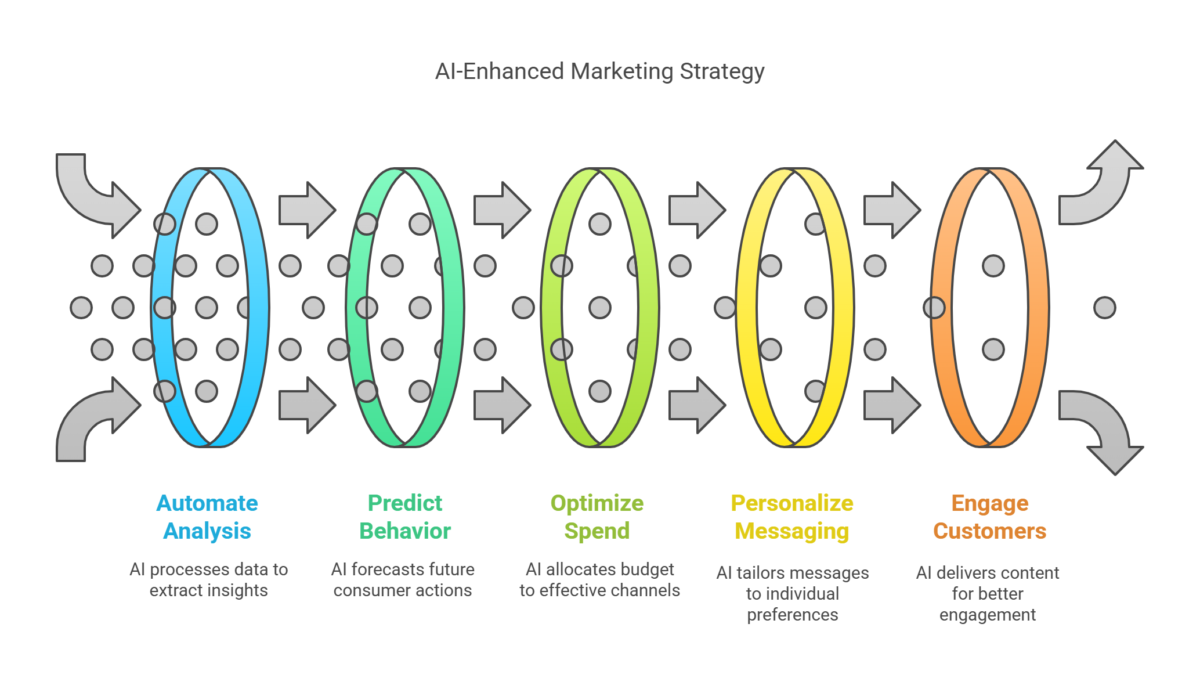Introduction
In the digital era, marketing is no longer about guesswork or intuition — it’s about harnessing data to make informed, strategic decisions. AI-driven marketing analytics are transforming how businesses engage with their audience by extracting valuable insights from vast amounts of data. These insights enable companies to personalize experiences, optimize campaigns, and maximize return on investment (ROI).
AI-powered data analytics is revolutionizing the marketing landscape by turning raw information into actionable strategies. In this article, we’ll explore how AI transforms data-driven marketing, the key technologies involved, real-world examples, and best practices for leveraging AI-driven insights.
The Rise of Data-Driven Marketing
Data-driven marketing involves collecting, analyzing, and interpreting data to refine marketing strategies and create personalized customer experiences. With AI, marketers can automate data analysis and derive insights faster and more accurately than ever before.
Why Data-Driven Marketing Matters
- Personalization – AI enables hyper-targeted messaging tailored to individual consumer preferences.
- Efficiency – AI automates data collection and analysis, reducing manual work and human error.
- Predictive Insights – AI can forecast customer behavior, helping businesses stay ahead of trends.
- Optimized Spend – AI ensures marketing budgets can be allocated to the highest-performing channels.
- Improved Customer Engagement – AI helps marketers deliver relevant content at the right time and place.

How AI Turns Data into Actionable Insights
AI-driven marketing tools leverage machine learning, natural language processing, and automation to analyze consumer data and recommend the best marketing strategies. Here’s how AI plays a pivotal role in transforming data into action:
1. AI-Powered Customer Segmentation
Traditional customer segmentation relies on demographic information, but AI takes it a step further by analyzing behavior, purchase history, and engagement patterns. This enables brands to create dynamic, evolving customer profiles that adapt in real time.
Example: Netflix uses AI to segment users based on viewing habits, ensuring personalized content recommendations that keep subscribers engaged.
2. Predictive Analytics for Marketing Strategy
AI-driven predictive analytics allows marketers to anticipate customer needs before they arise. By analyzing past behavior, AI can forecast trends, suggest optimal pricing strategies, and predict the likelihood of conversion.
Example:
Amazon’s recommendation engine predicts what customers might buy next based on past purchases and browsing history, significantly boosting sales.
3. AI-Powered Content Optimization
AI tools analyze user engagement data to determine what type of content performs best. AI can optimize headlines, email subject lines, blog topics, and ad copy for higher click-through and conversion rates.
Example: Persado, an AI-powered content generation tool, helps brands craft emotionally resonant marketing messages based on AI-driven language analysis.
4. Real-Time Marketing Automation
AI enables real-time personalization by adjusting marketing messages on the fly. Marketers can deliver dynamic content, personalized product recommendations, and automated email sequences tailored to each user’s behavior.
Example: Spotify uses AI to deliver curated playlists like “Discover Weekly,” which adapts based on a user’s listening history, enhancing engagement and retention.
5. Sentiment Analysis for Brand Reputation Management
AI-powered sentiment analysis tools scan social media, product reviews, and customer feedback to gauge public perception of a brand. This helps businesses respond to negative feedback quickly and capitalize on positive sentiment.
Example: Coca-Cola uses AI-driven sentiment analysis to monitor online conversations and adjust marketing campaigns accordingly.
Real-World Examples of AI in Data-Driven Marketing
Several major brands have successfully integrated AI-powered analytics into their marketing strategies:
1. Nike’s AI-Driven Personalization
Nike uses AI to analyze customer data and create personalized product recommendations. Through its mobile app, users receive tailored workout plans and product suggestions based on their fitness goals.
2. Starbucks’ Predictive AI Model
Starbucks leverages AI to predict what customers will order based on their previous purchases, location, and time of day. This enables targeted promotions and loyalty program rewards.
3. Sephora’s AI-Powered Chatbot
Sephora’s chatbot provides personalized beauty advice by analyzing customer preferences and recommending relevant products, enhancing the online shopping experience.
Challenges of Implementing AI in Marketing Analytics
Despite its benefits, AI-driven marketing comes with challenges:
1. Data Privacy and Security
With regulations like GDPR and CCPA, businesses must ensure responsible data collection and usage while maintaining customer trust.
2. Integration with Existing Systems
Many companies struggle to integrate AI tools with legacy marketing platforms, requiring significant investment in IT infrastructure.
3. Skill Gaps
AI requires expertise in data science, machine learning, and marketing analytics. Companies must invest in training or hire skilled professionals.
Best Practices for Leveraging AI-Driven Marketing Insights
To successfully integrate AI into your marketing strategy, follow these best practices:
1. Focus on High-Quality Data
AI models perform best when trained on clean, well-structured data. Ensure your datasets are accurate and relevant to improve AI-driven insights.
2. Choose the Right AI Tools
Invest in AI platforms that align with your marketing goals, such as Google Analytics for web insights, HubSpot for customer relationship management, or Persado for AI-driven content creation.
3. Test and Optimize Continuously
AI-driven marketing should be iterative. Regularly test AI-generated recommendations, track performance metrics, and refine strategies accordingly.
4. Maintain a Human Touch
While AI enhances efficiency, human oversight is crucial. Use AI to support decision-making but rely on human intuition for creative storytelling and brand voice.
5. Ensure Transparency and Ethical Use of AI
Be transparent with customers about how AI is used in marketing, especially when personalizing experiences based on user data. Ethical AI implementation fosters trust and long-term engagement.
The Future of AI in Data-Driven Marketing
As AI technology advances, its role in marketing will only expand. Here are some future trends to watch:
1. AI-Generated Video Content
AI tools like Synthesia are already capable of generating personalized video content, making video marketing more scalable and interactive.
2. AI-Powered Voice Search Optimization
With the rise of smart speakers and voice assistants, AI-driven SEO strategies will prioritize voice search optimization to capture conversational queries.
3. AI-Enhanced Augmented Reality (AR) Marketing
Brands will use AI-driven AR experiences to allow customers to visualize products in real-world settings before purchasing.
4. Hyper-Automation in Marketing
AI will drive end-to-end automation, from data collection to campaign execution, enabling marketing teams to operate with greater efficiency.
Conclusion
AI-driven marketing analytics is reshaping how brands engage with their audience. By turning raw data into actionable insights, AI enables personalization, predictive analysis, content optimization, and real-time marketing automation. While challenges like data privacy and system integration remain, businesses that invest in AI-powered strategies will gain a competitive edge.
As AI continues to evolve, companies must stay ahead of trends and adopt best practices to maximize their marketing impact. The future belongs to brands that can harness AI-driven insights effectively, creating meaningful customer experiences that drive growth and loyalty.
Sources:
Netflix’s AI-Powered Customer Segmentation:
- Whitelabel Loyalty. (n.d.). Segmentation & Personalization: How Netflix Creates Loyalty. Retrieved from https://whitelabel-loyalty.com/blog/marketing/segmentation-and-personalization-netflix-s-secret-sauce-for-creating-customer-loyalty
Amazon’s AI-Driven Recommendation Engine:
- Amazon Web Services. (n.d.). Amazon Personalize. Retrieved from https://aws.amazon.com/personalize/
Persado’s AI-Powered Content Generation:
- Persado. (n.d.). AI-Generated Content for Marketing. Retrieved from https://www.persado.com/
Spotify’s AI-Driven Personalized Playlists:
- Marketing AI Institute. (n.d.). How Spotify Uses Artificial Intelligence to Drive Personalization. Retrieved from https://www.marketingaiinstitute.com/blog/spotify-artificial-intelligence
Coca-Cola’s AI-Driven Sentiment Analysis:
- Search Engine Journal. (2024, December 15). Coca-Cola’s AI Holiday Campaign Faces Backlash. Retrieved from https://www.searchenginejournal.com/coca-colas-ai-holiday-campaign/533216/
Nike’s AI-Driven Personalization:
- Nike, Inc. (n.d.). Nike App: Your Personalized Shopping Experience. Retrieved from https://www.nike.com/nike-app
Starbucks’ Predictive AI Model:
- Starbucks Stories & News. (2019, March 21). How Starbucks is Using Predictive Analytics to Enhance the Customer Experience. Retrieved from https://stories.starbucks.com/stories/2019/how-starbucks-is-using-predictive-analytics-to-enhance-the-customer-experience/
Sephora’s AI-Powered Chatbot:
- TechRepublic. (2018, May 2). How Sephora is leveraging AR and AI to transform retail and help customers buy cosmetics. Retrieved from https://www.techrepublic.com/article/how-sephora-is-leveraging-ar-and-ai-to-transform-retail-and-help-customers-buy-cosmetics/
Keywords:
- AI in marketing, data-driven marketing, AI marketing analytics, predictive marketing, AI personalization, marketing automation, AI customer segmentation, AI content optimization

